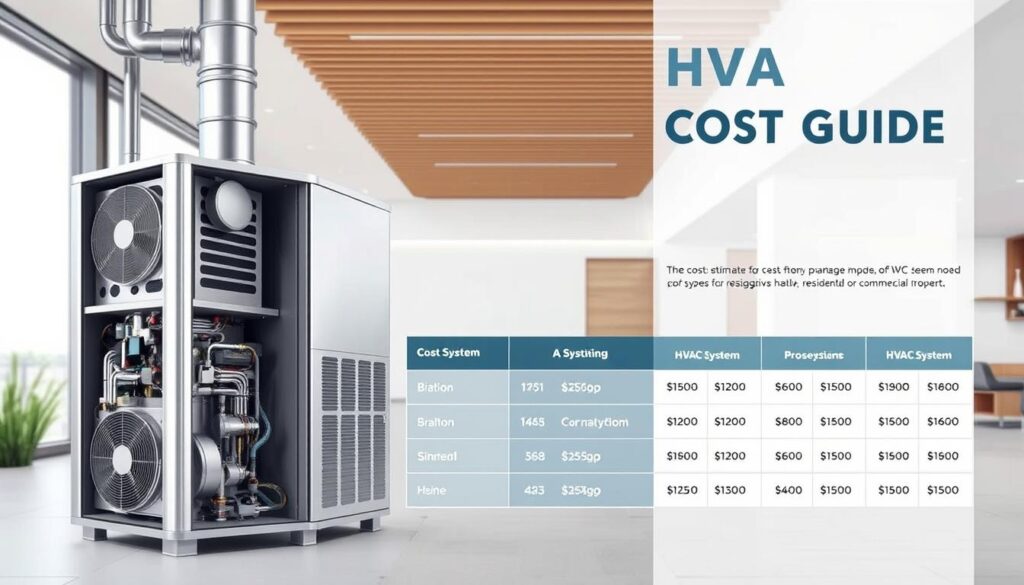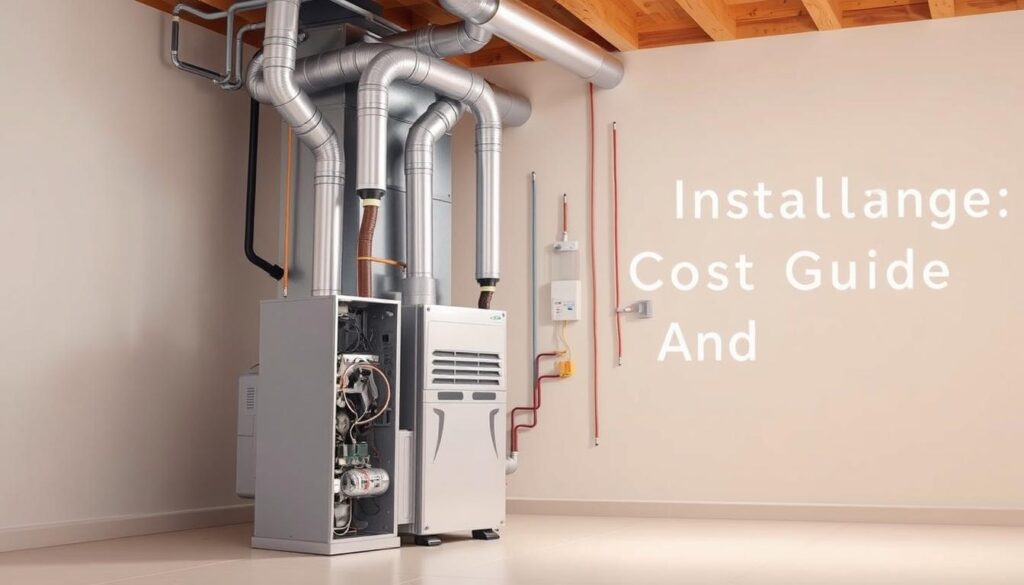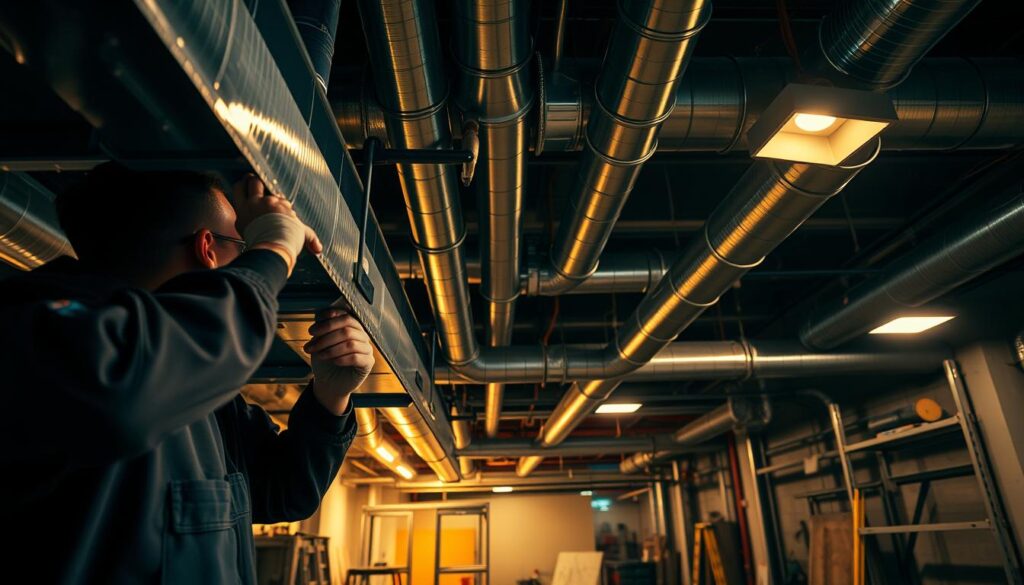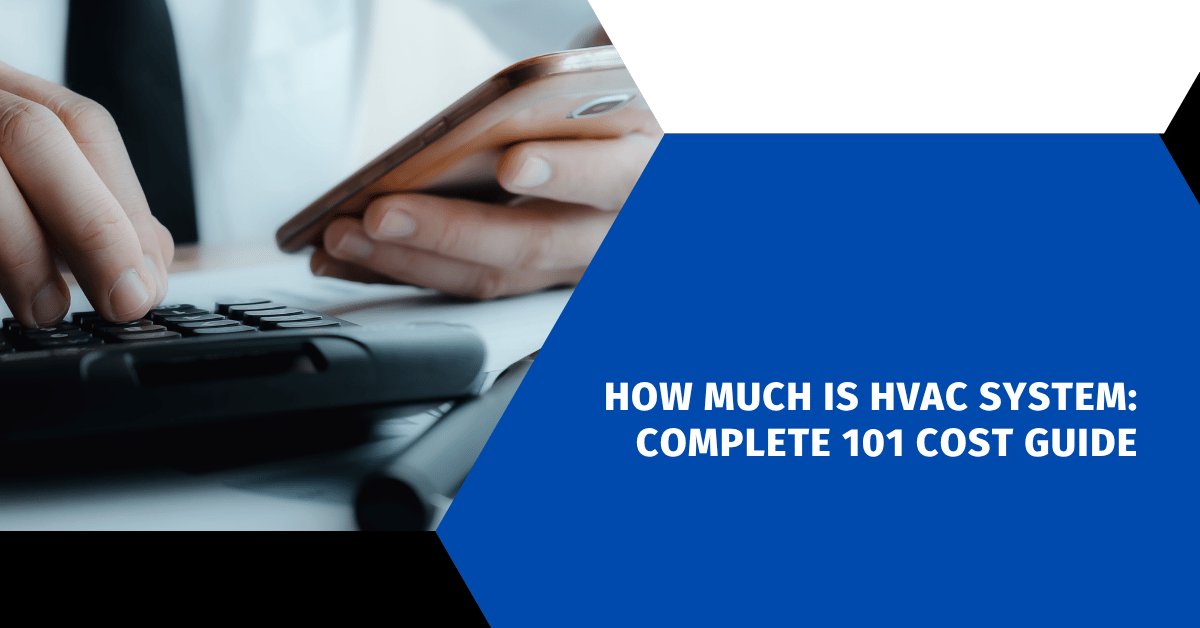Affiliate Disclosure
HVAC Guide Guys is a participant in the Amazon Services LLC Associates Program, an affiliate advertising program designed to provide a means for sites to earn advertising fees by advertising and linking to Amazon.
How Much Is HVAC System? Ever wondered what’s behind the cost of a complete HVAC system? Homeowners in the U.S. often find the prices surprising. The complexity and range of costs can affect your budget and comfort.

Knowing the cost of an HVAC system is key to smart decisions about your home’s heating and cooling. The average cost to replace it is between $5,000 and $11,000. Full installations can go up to $16,000, depending on your needs.
Your home’s size, layout, and climate greatly influence the HVAC system’s price. The quality of the equipment, its energy efficiency, and how hard it is to install also matter. These factors can change how much you’ll spend.
Key Takeaways
- HVAC system costs vary widely between $5,000 and $16,000
- Home size and layout significantly impact installation expenses
- Energy efficiency can reduce long-term operational costs
- Regional climate affects HVAC system selection and pricing
- Professional assessment is critical for accurate cost estimation
Table of Contents
Understanding HVAC System Basics
Keeping your home comfortable means knowing about HVAC systems. These systems are key for the right indoor temperature and air quality.
Today’s HVAC systems vary to fit different needs. The right one can boost your home’s energy use and comfort.
Exploring HVAC System Types
There are several main types of HVAC systems:
- Central Air Conditioning Systems
- Split System Air Conditioners
- Heat Pumps
- Ductless Mini-Split Systems
- Furnace and Boiler Systems
Essential Components of HVAC Systems
An HVAC system has a few main parts:
- Thermostat
- Heating Unit
- Cooling Unit
- Ductwork
- Air Filters
Energy Efficiency in Modern HVAC Technology
Energy efficiency is key for HVAC systems today. Modern systems use less energy but work better. Choosing a high-efficiency system can save money and help the environment.
Getting an energy-efficient HVAC system is smart. It’s not just about being comfortable.
When picking an HVAC system, think about your home’s size, climate, and comfort needs. Each system has its own benefits. The right choice can make your home comfortable and save on energy costs.
Explore Our HVAC Shop
Looking for top-rated HVAC tools, parts, and accessories? Visit our shop and find the perfect solution for your needs.
Visit the ShopHow Much Is HVAC System: Breaking Down the Costs
Figuring out the cost of an HVAC system can be confusing. Prices for HVAC units vary a lot, from $1,000 to $6,000. The total cost depends on several important factors.
When looking at HVAC system prices, you’ll find different costs:
- System type and capacity
- Energy efficiency ratings
- Brand quality
- Installation complexity
An average 3-ton HVAC unit costs between $1,700 and $5,000. This price reflects the system’s size and how well it works. Residential HVAC systems are not one-size-fits-all solutions. Your specific needs will affect the final cost.
When breaking down HVAC unit prices, consider many things. Homeowners should think about the equipment, installation, ductwork changes, and long-term energy use.
Pro tip: Invest in a high-efficiency system to reduce long-term energy costs and potentially qualify for tax incentives.
Your specific HVAC unit prices will depend on your home’s size, local weather, and current setup. Professional HVAC contractors can give you a detailed estimate based on your needs.
Factors Affecting HVAC Installation Costs
Knowing what affects hvac installation cost helps you choose the right heating and cooling system for your home. Many things, not just the equipment price, play a role in the total cost.
When you’re planning to install an HVAC system, several important factors will affect your total cost:
- Home square footage
- Regional climate requirements
- System complexity
- Labor rates in your area
Home Size and Layout Considerations
The size of your home is key in determining the right HVAC system. Bigger homes need more powerful systems, which can raise the cost. A professional will help figure out the exact system size for your home.
| Home Size | Estimated HVAC Cost Range |
|---|---|
| 1,000 sq ft | $3,000 – $6,000 |
| 1,500 sq ft | $4,500 – $9,000 |
| 2,000 sq ft | $6,000 – $12,000 |
Regional Climate Impact on Pricing
Your local climate is a big factor in choosing an HVAC system. Extreme temperatures mean you need a stronger system, which can cost more. Places with very cold winters or hot summers need special equipment to keep your home comfortable.
Labor and Installation Complexity
The complexity of the installation can also change the cost. Things like ductwork changes, electrical work, and structural issues can add to labor costs. Experts will look at these details to give you a clear price estimate.
It’s wise to talk to certified HVAC pros. They can assess your needs and create a detailed plan for your home’s specific requirements.
Explore Our HVAC Shop
Looking for top-rated HVAC tools, parts, and accessories? Visit our shop and find the perfect solution for your needs.
Visit the ShopCentral Air Conditioning System Costs
Knowing the cost of installing central air conditioning is key for homeowners looking to cool their homes better. These systems cost between $3,000 and $7,000. This price varies based on several factors that affect the cost.
When you think about getting a central air system, consider a few important things:
- Home square footage
- System efficiency ratings
- Local climate conditions
- Existing ductwork infrastructure
The size of your home is a big factor in the cost. Smaller homes might need a 1.5-ton unit, while bigger homes could need 5-ton systems. Each ton can cool 12,000 BTUs, which affects the price.
How efficient the system is also matters. Better efficiency means more savings but costs more upfront. Efficiency ratings range from 13 to 26 SEER, with higher numbers being more efficient.
“Investing in an efficient central AC system can save you money on long-term energy expenses.”
Your local climate also plays a role. Areas with very hot summers might need stronger systems. This can make the system more expensive.
Pro tip: Always get multiple quotes from certified HVAC professionals to ensure you’re getting the best value for your central air conditioning installation.
Heat Pump Installation Pricing
Heat pumps are a great choice for keeping your home comfortable. They work for both heating and cooling. The cost to install a heat pump can change based on the type you pick.
Heat pumps are good for managing your home’s temperature. They move heat around instead of making it. This can save a lot of energy. Knowing your options can help you choose the best for your home.
Air Source Heat Pump Costs
Air source heat pumps are often the cheapest option. They cost between $4,000 and $8,000 to install. This price depends on your home’s size and needs.
- Average system cost: $4,000 – $8,000
- Suitable for moderate climates
- Lower upfront HVAC installation cost compared to other options
Ground Source Heat Pump Expenses
Ground source (geothermal) heat pumps are more expensive but efficient. They use the stable temperature underground. This makes them very efficient but costs more to start.
- Installation costs: $10,000 – $25,000
- Significant long-term energy savings
- Minimal environmental impact
Ductless Mini-Split System Pricing
Ductless mini-split systems are great for homes without ducts. They offer precise temperature control. They are also relatively affordable to install.
- Installation range: $2,000 – $7,000
- Ideal for room additions or supplemental heating
- Easy installation with minimal home disruption
Pro tip: Always talk to a professional HVAC contractor. They can help pick the best heat pump for your home and local weather.
Furnace Installation Expenses

Understanding furnace installation costs is key to choosing the right heating system for your home. The cost of HVAC installation changes based on several important factors. These factors affect how much you’ll spend.
When looking at furnace replacement, you’ll find different types with varying prices:
- Gas Furnaces: Most common, ranging from $2,500 to $5,000
- Electric Furnaces: Typically less expensive, costing between $1,500 and $3,500
- Oil Furnaces: Usually the most expensive, with prices from $4,500 to $6,500
Your hvac replacement cost will depend on several key factors:
- Home square footage
- Existing ductwork condition
- Energy efficiency ratings
- Local installation labor rates
Professional installation is vital for your furnace to work its best. Labor costs can range from $500 to $2,000. This can greatly affect your total furnace cost. Choosing the right furnace means balancing initial costs with long-term energy savings and efficiency.
Pro tip: Always get multiple quotes and consider both short-term expenses and long-term energy efficiency when choosing your new furnace.
Explore Our HVAC Shop
Looking for top-rated HVAC tools, parts, and accessories? Visit our shop and find the perfect solution for your needs.
Visit the ShopHVAC Brand Comparison and Pricing
Choosing the right HVAC brand is key to your home’s comfort and energy efficiency. Prices vary a lot among different brands. It’s important to know the differences between high-end and budget options.
There are many HVAC brands to choose from. They vary in quality, performance, and energy efficiency. Knowing these differences helps you make a smart choice for your home’s heating and cooling.
Premium vs. Budget Brands
Top-tier HVAC brands offer big advantages:
- Carrier: Known for high-end technology and superior performance
- Lennox: Delivers exceptional energy efficiency
- Trane: Provides robust and reliable systems
| Brand Category | Average Cost Range | Energy Efficiency Rating |
|---|---|---|
| Premium Brands | $5,000 – $12,000 | Up to 20 SEER |
| Budget Brands | $3,000 – $7,000 | 14-16 SEER |
Warranty Coverage Differences
Warranty terms can affect your long-term costs. Premium brands usually offer:
- Longer coverage periods
- More complete parts protection
- Extended compressor warranties
Long-term Value Considerations
While budget brands might seem cheaper at first, premium HVAC systems often save money in the long run. Think about energy savings, durability, and repair costs when choosing.
Ductwork Costs and Considerations

Ductwork is key to your HVAC system’s performance and efficiency. The right ductwork improves your home’s comfort and saves on energy costs.
Replacing ductwork costs between $1,400 and $5,600. Installing new ductwork can cost between $2,400 and $6,600. Prices vary based on several factors:
- Home square footage
- Duct material complexity
- Accessibility of installation areas
- Local labor rates
Replacing your HVAC can get more expensive if your ductwork needs big changes. Getting a professional assessment is important to figure out if you need to replace part or all of your ductwork.
Here are key things to check when evaluating your ductwork:
- Age of current ductwork
- Evidence of air leaks
- Insulation quality
- Potential energy efficiency improvements
Professional HVAC contractors can guide you through ductwork installation. They ensure your system works well and save you money.
“Proper ductwork is the circulatory system of your home’s heating and cooling infrastructure.”
Quality ductwork design saves energy in the long run. It also makes your home more comfortable.
Energy Efficiency and Operating Costs
Learning about hvac energy efficiency can save you a lot of money. Modern HVAC systems can greatly cut down your energy use and lower your monthly bills.
When looking at HVAC efficiency, you’ll see important numbers like SEER (Seasonal Energy Efficiency Ratio) and AFUE (Annual Fuel Utilization Efficiency). These numbers show how well your system turns energy into cooling or heating.
“Investing in high-efficiency HVAC equipment can reduce your energy costs by up to 30%.”
- High-efficiency units usually cost more at first
- But, they save you money in the long run
- SEER ratings above 16 mean your system is very efficient
Your hvac maintenance cost is key to keeping your system efficient. Regular upkeep stops energy waste and makes your system last longer.
| SEER Rating | Energy Efficiency | Estimated Annual Savings |
|---|---|---|
| 13-14 | Standard | $0-$100 |
| 15-16 | Good | $100-$200 |
| 17-20 | Excellent | $200-$350 |
To get the most efficiency, think about using a smart thermostat, better home insulation, and getting your HVAC checked by pros every year.
Explore Our HVAC Shop
Looking for top-rated HVAC tools, parts, and accessories? Visit our shop and find the perfect solution for your needs.
Visit the ShopHVAC Rebates and Tax Incentives
Looking into hvac rebates and incentives can cut down your HVAC system costs. The federal government and local utilities have programs to help with energy-efficient upgrades.
Homeowners can find several incentives:
- Federal tax credits for energy-efficient systems
- State-level rebate programs
- Utility company incentive packages
- Manufacturer discount offerings
To save more, check out these resources:
- Energy Star Rebate Finder – A detailed national database
- Database of State Incentives for Renewables & Efficiency (DSIRE)
- Local utility company websites
| Incentive Type | Potential Savings | Eligibility |
|---|---|---|
| Federal Tax Credit | Up to $2,000 | High-efficiency heat pumps |
| State Rebates | $500-$1,500 | Energy Star certified systems |
| Utility Incentives | $300-$1,000 | Residential HVAC upgrades |
Make sure to keep records of your purchases. Also, check the details for each incentive program. Talking to a local HVAC expert can guide you through these options and help you save more.
Conclusion
Figuring out the cost of an HVAC system is more than just the initial price. It’s about long-term comfort, energy savings, and how well your home works. Doing your homework and talking to experts can guide you to the best choice for your home.
When looking at HVAC systems, think about your home’s size, the weather, energy ratings, and any discounts. Brands like Carrier, Trane, and Lennox have different prices and performance. The best system will balance upfront costs with long-term savings, giving you great value.
Keeping your system in good shape is key to its long life and performance. Getting it checked every year can avoid expensive fixes and keep energy use low. By understanding all costs, you’ll make a wise choice that keeps your home cozy for years.
Every home is different, and what fits one might not work for another. Talking to local HVAC experts who know your area well can help you choose and install the right system.

